
| Bad Astronomy |
|
|
|
BA Blog
|
|
Q & BA
|
|
Bulletin Board
|
| Media |
|
|
|
Bitesize Astronomy
|
|
Bad Astro Store
|
|
Mad Science
|
|
Fun Stuff
|
| Site Info |
|
|
|
Links
|
| RELATED SITES |
| - Universe Today |
| - APOD |
| - The Nine Planets |
| - Mystery Investigators |
| - Slacker Astronomy |
| - Skepticality |
Buy My Stuff

Keep Bad Astronomy close to your heart, and help make me
filthy rich. Hey, it's either this or one of those really
irritating PayPal donation buttons here.
The Planet X Saga: The Scientific Arguments in a Nutshell
Let me be very clear here: Nancy Lieder, Mark Hazlewood and the rest of these Planet X people (hereafter referred to as "PXPs") are completely wrong. No rogue giant planet is about to destroy the Earth, in May 2003 or otherwise. The webpages on this and other sites give lots of details, but I thought it might help if I made a brief synopsis of the arguments I and others make to debunk this pseudoscientific silliness. Listed below are the major points against the claims of the PXPs. Feel free to use them to make yourself feel better, or to use on someone who is contemplating the Dark Side.
- Ancient texts do not discuss the existence of a tenth planet.
- There is no astronomical indication of the existence of another large planet in the inner solar system.
- The Sun is not acting in any way abnormally.
- There are not more earthquakes than normal.
- There has been a lot of weird weather lately
- Brown dwarfs are not at all the way Planet X people describe.
- Observatories are not being closed suspiciously.
- The pictures that have been posted are either outright fakes or being misinterpreted.
- I am not a government disinformation agent.
- The Grand Conclusion (guess what it is)
- Links and acknowledgements
Ancient texts do not discuss the existence of a tenth planet.
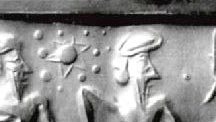
|
| Image of the Berlin Seal, which doesn't show Planet X |
But there are two major problems with this. Well, three, if you count having alien visitations as a problem (and I certainly do). But ignoring that, there are still two biggies. Sitchin claims that the picture shows Uranus, Neptune and Pluto. But the Sumerians didn't have telescopes, and therefore could only have known of them if aliens told them about their existence. But if aliens told them about those planets, why not about the moons of Jupiter and Saturn, or Saturn's rings? The seal doesn't show any of these features. And the Sumerians thought the Moon and Sun were planets, when they aren't. Certainly aliens would know that the Sun and Moon are not planets! Sitchin is picking and choosing things in the picture to support his arguments, and ignoring things that don't support it. That isn't science, it's fantasy. It's also wrong.
Worse, his interpretation of the picture is wrong. The Sumerians have an unambiguous symbol for the Sun: a circle with four triangles around it like rays, and squiggly lines between the triangles. That is emphatically not the symbol in the seal. The symbol used is that of a bright star, but not the Sun. So even Sitchin's basic premise is wrong. Michael Heiser, a Sumerian scholar, outlines all this on his website.Conclusion: Sitchin's ideas are wrong, and so there is no reason to even introduce the idea of a tenth planet that passes by the Earth.
There is no astronomical indication of the existence of another large planet in the inner solar system.
In my opinion, this is the biggest problem with the Planet X myth. Simply put: where is it? We don't see it optically, and we don't see any effects gravitationally.

|
| Image of Jupiter in the night sky (click to enlarge), from Astronomy Picture of the Day |
Yet, for Planet X to be here in less then a decade, it can't be farther than a billion or so kilometers away. Even at that distance, it would be one of the brightest objects in the sky. Even if it were too faint to be seen with the naked eye, it would still be seen easily even if it were billions of kilometers away. Remember, tiny Pluto is 5 billion kilometers out, and can be easily detected using modern equipment, and Pluto is way smaller than Planet X is supposed to be. There is simply no way a big planet so close to Earth could have escaped astronomers' detection-- even amateur astronomers, who even Lieder and Hazlewood must realize have no reason to lie-- all these decades.
Also, a giant planet has giant gravity. Neptune was discovered because of its gravitational effects on Saturn and Uranus. Planet X, if it were anywhere near the inner solar system (and in truth, even a long way out), would pull on those planets. This pull would affect their orbits, and we'd see that. We don't. Some of the Planet X proponents talk about how the outer planets' orbits are indeed affected, but they are relying on very old data. In fact, the planets are exactly where they should be given the nine planets we know about.
A lot of PXPs talk about a couple of scientific papers published which talk about perturbations in comet orbits indicating a possible tenth planet. I have read both papers, and found them to be interesting, but unlikely. They are more speculation than hard science, in my opinion. But even if they are correct, they would indicate a planet that is way, way farther out than Hazlewood and Lieder claim for Planet X, and in fact would indicate there is no massive planet closer to the inner solar system. As usual, by pointing out scientific evidence they think supports their position, the PXPs are actually highlighting evidence against them.
Another favorite claim of Mark Hazlewood is that NASA found the tenth planet back in 1983, and even announced it. This is patently untrue. What really happened was that a satellite used to make astronomical observations in infrared light found several objects that were previously unidentified. During a press conference, the astronomers made a list of potential sources, including (but not limited to) a tenth planet. Of course, the headline in the Washington Post zeroed in on the planet possibility, but science is generally not done by headlines. Sure enough, follow-up observations made later showed clearly that most of the objects were distant galaxies, and another was a gas cloud in our own Galaxy. No planet.
Of course, Hazlewood and his ilk claim that NASA got wise and quickly covered up the discovery of the tenth planet, but let's face it, that claim is pretty dumb. This was a NASA press conference in the first place, and if they were this ultra-competent super-secret organization that Hazlewood makes them out to be, or even if they were middling-competent bureaucrats, the press conference wouldn't have been held in the first place! And at the very least, the astronomers involved would have been briefed not to reveal anything secret. The PXPs want it both ways: they want NASA to be so good they can change journal articles, web pages, astronomical catalogs and more with iron-clad authority, but so bumbling they couldn't keep two astronomers and a DC reporter shut up. Puhleeze!
Conclusion: Planet X has no physical effects, has never been seen, and therefore doesn't exist.
The Sun is not acting in any way abnormally.
The PXPs love to scream every time the Sun undergoes an eruption, whether it's a flare or coronal mass ejection (or CME for short). They say that the peak in the 11 year solar cycle was two to three years ago, and therefore the Sun should be quiet now. Any eruption is therefore evidence of effects from Planet X.
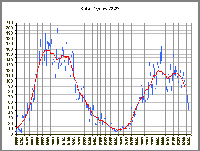 This is wrong. The Sun did indeed peak in the year 2000, but these peaks
are not sudden; they grow and fade slowly, over years. In fact, each peak
actually has two sub-peaks; solar activity rises, then declines, then
rises again a year or so later, as can be seen in the plot shown
(click on it to bring up a bigger version of the image). We are
just now finishing up the second peak, and as you can see we should expect
plenty of activity on the Sun. I talked to a couple of solar astronomers,
and they both told me that the flares and CMEs in the second peak tend
to be more violent than in the first, so we actually expect more
energetic activity in the second peak, that is, now.
This is wrong. The Sun did indeed peak in the year 2000, but these peaks
are not sudden; they grow and fade slowly, over years. In fact, each peak
actually has two sub-peaks; solar activity rises, then declines, then
rises again a year or so later, as can be seen in the plot shown
(click on it to bring up a bigger version of the image). We are
just now finishing up the second peak, and as you can see we should expect
plenty of activity on the Sun. I talked to a couple of solar astronomers,
and they both told me that the flares and CMEs in the second peak tend
to be more violent than in the first, so we actually expect more
energetic activity in the second peak, that is, now.
Conclusion: the Sun is acting normally, and its behavior does not support the existence of Planet X.
There are not more earthquakes than normal.
This claim is similar to the one about the Sun. The PXPs say that earthquakes are on the rise, which indicates effects by Planet X. Every time there is a large earthquake, the PXPs say this is evidence for Planet X.
 This is wrong. The table displayed here (click on it to bring
up a bigger version of the image) shows earthquake activity
over the past 13 years. The quakes are
divided by strength (vertically) and year (horizontally).
The data are complete for 2002,
meaning every earthquake measured is there.
This is wrong. The table displayed here (click on it to bring
up a bigger version of the image) shows earthquake activity
over the past 13 years. The quakes are
divided by strength (vertically) and year (horizontally).
The data are complete for 2002,
meaning every earthquake measured is there.
If Planet X is nearly here, then you'd expect to see an increase of major earthquake activity over time, with 2002 having the most. Surprise! It doesn't. In fact, 2002 is usually average or even below average in the number of major earthquakes for a given magnitude that occurred.
You may notice that the actual total number of earthquakes does appear to increase with time, but that is not because there are more earthquakes. It's because we're getting better at detecting them! As instruments become more sensitive, more earthquakes are detected. Note that the increase is mostly in the number of small quakes, which are usually harder to detect. Better instrumentation naturally detects smaller quakes more easily, increasing the total number found without changing the number of big quakes found, because those are easy to detect and we catch them all with less sensitive equipment. Supporting this is the last line of the graph, which shows only a few very weak earthquakes in the 0-1 range. There are probably more of those than any other earthquake, but are far harder to detect unambiguously (a car driving by might look just like a magnitude 0.1 earthquake to a seismograph). The United States Geological Survey has a webpage describing exactly this finding. So, if Planet X is real and affecting us, it must be suppressing earthquakes, not causing them.
There were two big earthquakes in January 2003, both over 7 on the Richter scale. The PXPs went nuts about them. But look at the plot! Two magnitude 7 earthquakes in one month means you'd expect 24 in a year, right? Well, you can see that 24 magnitude 7 earthquakes per year is just about right given the earthquake history. So once again, by bringing this data to everyone's attention, the Planet X people are shooting themselves in the foot.
Conclusion: there no more earthquakes than usual, and therefore earthquakes cannot be used to support the existence of Planet X.
There has been a lot of weird weather lately.
Another big claim is that there has been a lot of unusual weather going on; tornadoes, droughts, storms, etc. Like earthquakes and solar flares, every time it rains it seems like it must be due to Planet X.First off, surprise! The weather isn't all that weird. We are coming off of an El Nino, which is a weather pattern that disrupts climates across the world. Also, we are now into springtime, when things like tornadoes are common. Seeing tornadoes in Texas and Oklahoma is not only not unusual, but is expected!
There have been some records broken this year, but there are weather records broken every year. This is exactly the same sort of bad logic used in the earthquake argument, and is just as wrong. Even a cursory web search yields lots of pages about the odd weather we get as El Nino departs.
And even if it were true, how could the weather possibly be to tied to an incoming planet? If you assume electromagnetic forces, we'd see huge changes in our aurora before we'd see changes in the weather, and we see no such changes. If it were gravitational, then there would be countless other, far larger effects. Long before the weather were disrupted, we'd see changes in the Moon's orbit that were so big they would be unmistakable. They would certainly throw off the timings of eclipses, and we'll see on May 15th that there will be a lunar eclipse right on schedule.
Conclusion: the weather isn't any weirder than it usually is at the end of an El Nino, so the claims of weird weather are wrong.
Brown dwarfs are not at all the way Planet X people describe.
A brown dwarf is an object that is something bigger than a planet, but smaller than a star. An object with more than about 0.077 times the Sun's mass (about 80 times Jupiter's mass) will ignite nuclear fusion in the core, making it a full-blown star. The lower mass limit is somewhat less clear, but we can safely say that Jupiter is below it. Even if we call Jupiter a brown dwarf, it is still far larger than what Nancy Lieder and Mark Hazlewood say is the mass and diameter of Planet X. Nancy says it's 4 times the radius of Earth (Jupiter is 11 times Earth's radius) and about 20 times as massive (Jupiter is 310 times as massive as the Earth). Hazlewood's claims are similar. Neither of them describe anything even close to a brown dwarf.Also, even an old, dim brown dwarf puts out light. A typical dim brown dwarf would still be a very bright object if it were anywhere near the inner solar system, or even located way out beyond Pluto. I even show my math! Remember too that a brown dwarf will still reflect sunlight (like Jupiter and the other planets do), making it even brighter. So if Planet X were a brown dwarf, it would have been obvious in the sky years ago.
Using the term to describe Planet X is simply wrong. I suspect they might use the term to sound more scientific, but again, as always, they wind up making themselves look foolish.Conclusion: Nancy Lieder and Mark Hazlewood do not understand brown dwarfs at all, and saying Planet X is a brown dwarf is actually further evidence that they don't know what they are talking about, and that Planet X doesn't exist.
Observatories are not being closed suspiciously.
Many of the PXPs (notably Mr. Hazlewood) have been claiming that observatories around the world are being closed "suspiciously" (ever noticed how nothing can just happen in a conspiracy theory?). They claim to have a long list of them, though I have yet to see them actually post such a list. They do mention such observatories as Griffith in Los Angeles. Why are they closing? Because, claim the PXPs, they don't want the public to see Planet X through these observatories. If the public demands to see this planet through the powerful telescopes, then the jig, as they say, is up. So the government is closing them down.But this makes no sense whatsoever. First, as I have shown, Planet X, if it existed, would be a pretty bright object. If we believe Nancy Lieder, then it should be so bright it would be visible even if you wear sunglasses. Mark Hazlewood claims it's still far away, but even if it were years away, it would be easily spotted in a telescope of very modest size; certainly in the range of thousands of amateur instruments. So closing public observatories makes no sense.
Moreover, the only way to keep this quiet would be to close all telescopes with public access. Every single one. Yet there are hundreds of observatories still open. I recently used some 'scopes at the Buehler Observatory in Fort Lauderdale, for example, when it was open for public night. Chabot Space and Science Center in Oakland, California, has several telescopes the public can use. The list goes on for hundreds of observatories that are not only open, but actively showing the skies to the public.
I expect PXPs will then claim that the observatories remaining open simply won't show Planet X to the public. Then why close any at all? Again, it makes no sense. Either all observatories get closed, or none does. They might claim that only observatories with big enough 'scopes were shut down, but that's not true. Plenty of observatories with pretty big 'scopes remain open.
Conclusion: Observatories are indeed closing, but only for renovation. Plenty of observatories with public access and large telescopes remain open. Therefore there is no government conspiracy to close telescopes down to prevent people from seeing Planet X.The pictures that have been posted are either outright fakes or being misinterpreted.
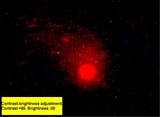
|
| Planet X? Nope, an admitted hoax! |
Some are such simple misinterpretations that it's hard to believe people don't understand what they are seeing. There are several examples of what have been called "second suns", which supposedly show Planet X as a reddish disk near the Sun. Here's a good one from Ms. Lieder's site. But it's clearly an internal reflection; the sunlight bouncing off the lenses inside the camera. The giveaway is how it moves from picture to picture as the camera itself is moved and rotated. A regular contributor to the Bad Astronomy Bulletin Board who goes by the name "Deepspacegirl" has a website which shows a similar picture taken in 2002! Obviously, it's not Planet X.
Some of Ms. Lieder's acolytes have gone out and taken digital images of the night sky through telescopes, and claimed to have found Planet X. They are wrong. Digital images are not as simply processed as a roll of film, and in fact takes weeks of training to understand the details. I studied digital cameras for years working on Hubble data, and have a pretty good insight into this. The basic problem with Ms. Lieder's images is in how the calibration data were processed. Unlike a point-and-shoot camera, an astronomical detector needs lots of pictures taken under controlled circumstances so that you can understand what is real in the image and what isn't. I bet you can see where this is going.
When charged particles hit an electronic detector, they leave a bright spot in the image. These kinds of particles are produced by the Sun, and can hit the detector in the camera. They are also produced by naturally radioactive elements, many of which can be found as impurities in the metal of the camera assembly. They are a nuisance, so you have to understand how to take care of them.
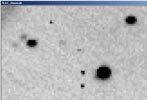
|
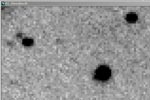
|
| Badly processed image, showing lots of cosmic ray hits | Correctly processed image. Voila, "Planet X" is gone. |
| From IMOpenminded's website | |
Shockingly, Ms. Lieder doesn't understand how to do this, nor do her acolytes. They consistently and persistently leave in these hot spots, and then claim they are Planet X. Seriously! They are not a gigantic planet about to kill us all, but instead are dinky little protons who have had the unfortunate fate of slamming into the electronic chip on the back end of a telescope. Correctly processing the images would make those spots disappear, as has been shown by others. This would be somewhat more difficult with a whole planet.
By the way, Ms. Lieder has claimed on numerous occasions that Planet X would be naked-eye visible months before its passage, yet she also claims it appears as a faint dot in the images she herself supplies. Which is it? She says lots of contradictory things, which is yet another good reason to disbelieve what she is saying (another example, not to be indelicate, is that she said (through her channeled aliens) that the then-missing Washington intern Chandra Levy was alive and well and living in Mexico. Ms. Levy's remains were found shortly thereafter in Washington, DC).
Remember, we are dealing with people with zero experience in astronomy, let alone astronomical imaging. They are easily fooled; don't forget that Mr. Hazlewood mistook a Hubble image of Jupter's moon Io for an image of Planet X! So you might want to think twice before believing what they say. They don't want you to think twice; from the evidence I have seen, they don't want you to think at all.
Conclusion: fake pictures and real ones that are misinterpreted do not support the existence of Planet X.
I am not a government disinformation agent.
Just about every purveyor of Planet X has said at some time that I am a liar, or deluded, or a paid NASA or NSA or CIA disinformation agent. James McCanney told a bare-faced lie on the radio, saying I have a "mansion" and a "luxurious office" (it's a lie because he doesn't know what kind of home or office I have, therefore he knows he cannot make any conclusions about them, and therefore he lied). I laughed out loud when I first heard him say this; I was sitting in my "luxurious" 10x12 foot office that I shared with a coworker. It was so cramped we couldn't both push our chairs back at the same time.The assertion that I am some kind of spook is silly. Think about it: I am a professional astronomer, with a traceable history of doing relatively good science (I have a dozen or so journal articles with my name on them). How much money do you think I could make if I started a cult about Planet X? I could make as much money just as easily by writing a book and getting on talk shows. I could name my price to Fox TV. So there is no monetary incentive for me to debunk Planet X, unless I truly believe it isn't real. If you think the government would give me more money than Fox TV, then you are beyond any logic I can provide you.
Ironically, and in fact, all the Planet X purveyors are known liars, or at least deceptive. Since they have no evidence I am a disinformation agent, and yet they still call me that, they are knowingly lying. They may believe it's true, but they have no evidence of it, and so cannot honestly state that claim as truth.
Hazlewood has claimed on many occasions that I spend time fighting him because he is "on to something". That's a silly statement. Imagine yelling a racial slur at someone on the street. Don't you think they would get angry, and perhaps even argue about it? Wouldn't you, if someone attacked something you loved for no reason and without any merit to their arguments?
The claims that I am deluded are just as silly. I actually have evidence that what I say is correct, and also show exactly where Lieder and the others are wrong. All they can do against me is cry about a government conspiracy with no evidence whatsoever. So do you agree with someone with lots of evidence, or someone with none whatsoever, just hearsay, deception, and/or outright lies?
Conclusion: There is no evidence that I am anything but who I say I am: a professional astronomer who loves astronomy, and doesn't like hearing the Planet X purveyors misleading others about it. Slurs (and let's face it, slander) against me do not support the existence of Planet X.
The Grand Conclusion
Planet X doesn't exist, and we are in no danger from a giant planet, rogue or otherwise. Lieder, Hazlewood and the rest of that group are wrong. They may be consciously lying, or have a tenuous grasp on reality, but in the end it doesn't matter: they are still wrong.Links and Acknowledgements
I owe a debt to many people for helping me with this work, whether they knew it or not. Here are some links to people who have more info on this myth, some of which I relied on here on this page.- The Planet X and the Pole Shift site has lots of great information. it is from there I got the data on earthquakes and the solar cycle. Lots of good pages and links there too.
- Comixx, a contributor to the Bad Astronomy Bulletin Board, posted a Planet X/Nibiru FAQ which has more concise information covering some different ground. The follow-up posts are very helpful as well.
- Planet X image analysis is done at DeepSpaceGirl's website .
- Openminded's website of image analysis
- SkepticalMind's vast overview of Nancy Lieder
- Brian Gillbanks was originally a follower of Nancy Lieder, but then discovered the truth. Read his fascinating, but disturbing, story of the ZetaTalk cult.
|
|
|
|